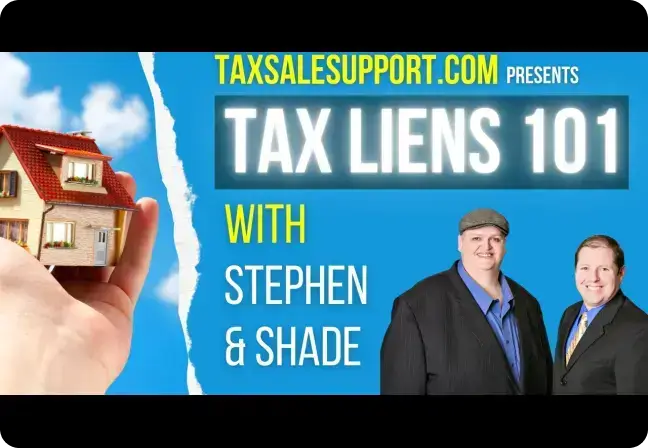All Categories
Featured
Table of Contents
Oftentimes, you will need to outbid various other capitalists by offering to pay a greater premium (how to do tax lien investing). This costs is normally much less than the real quantity of taxes owed, however it depends on the investor to determine if the threat deserves the collection incentive. In the majority of places, real estate tax are around one percent of the home's worth

Tax lien financiers make their cash on the interest repayments they accumulate when the house owner pays back the taxes they owe. In some locations, these interest rates are as high as 18 percent, which is more than the ordinary bank card rate of interest. Property owners can pay what they owe at one time, or they can take place a settlement plan ranging from one to three years.
Are Tax Liens A Safe Investment
In the above instance, a person with an impressive tax financial obligation of $4k (two years of back taxes) would certainly be offering a tax obligation lien owner with possibly up to $720 in interest payments, dealing with the 18 percent rate of interest we discussed earlier. Among the greatest advantages to tax lien capitalists is the prospective to get a new building for their realty profile, without needing to pay its market price.

It's a win-win circumstance for the tax obligation lien investor. There are some cons to tax obligation lien investing.
When the lien is paid, the investor must go on and search for a new investment. Obviously, if the homeowner is still in default, the lien owner will certainly acquire the building, which can become a repeating income. Someone that buys a tax obligation lien might find themselves entangled with other liens on the home, especially if they finish up asserting the property in the event that the financial debt goes unsettled.
This can lead to great deals of lawful fights, which is why it is necessary to collaborate with lawyers and tax obligation advisors who understand things like action vs title. and can aid with carrying out due persistance on a building. The laws around tax obligation lien investing (and associated issueslike foreclosing on lessees) are not consistent throughout states that provide financiers the ability to get involved in a tax lien sale.
Offered that tax liens are usually marketed at public auction, competing prospective buyers will bid up the costs and bid down the rates of interest that can be accumulated on the unpaid taxes. The champion of the auction will be the genuine estate financier who is paying the highest possible costs and obtaining the cheapest rate of interest in return.
Tax Lien Investing Risks
In this blood vessel, tax obligation lien investing is a little bit extra sport-like than traditional easy means of making income. The first thing you'll want to do is get knowledgeable about the area you're considering in terms of the property market. Bear in mind that one upside of coming to be a lienholder is accumulating the property if the debt goes unpaid, so you will certainly require to understand where that property is.
When you've identified these information out, you need to call your regional area treasurer's workplace to discover out when and where the next tax lien public auction is being held. These auctions are usually kept in individual, yet in today's day and age, a number of have transitioned to online locations.

A lot of local papers release these listings each year or semiannually. Bear in mind that building taxes are typically one percent of the home value, yet unpaid taxes building up over several years could be a much more large quantity.
Investing In Tax Lien Certificates For Beginners
it has the added perk of obtaining the residential or commercial property if the financial obligation stays unpaid. While it can be a lucrative chance for the capitalist, it does require some critical maneuvering. Occupants and homeowner do have lawful protections that make tax obligation lien investing a much more involved process than just bidding to buy a financial debt and waiting to collect the repayment.
Buying tax obligation liens entails acquiring a lawful claim on a building as a result of unsettled real estate tax. This technique of investing has actually acquired popularity because of its capacity for high returns with reasonably low first funding. Tax liens are commonly cost public auctions, and the procedure can vary depending on the place.

Financiers seek out tax obligation liens for numerous factors: 1. Low Initial Investment: Tax obligation lien investing usually needs a little amount of cash to begin, making it available to a vast array of capitalists.
How To Start Tax Lien Investing
Residential or commercial property Purchase: If the residential or commercial property proprietor fails to pay the past due taxes and passion within the redemption duration, the investor might have the right to seize and obtain the property. When financiers acquire a tax obligation lien, they pay the past due tax obligations on a home and receive a tax lien certification.
Settlement by the Residential Property Owner: The property owner pays off the overdue tax obligations plus passion within a specified period, and the capitalist receives the settlement with rate of interest. Foreclosure: If the home owner does not settle the taxes within the redemption duration, the financier can launch repossession procedures to get the building.
The self-directed IRA acquisitions the lien certification and pays associated costs. Tax Lien: The federal government markets a lien on the property due to unsettled taxes.
Real Estate Tax Lien Investments For Tax Advantaged Returns
Tax obligation Act: The government offers the real deed to the home at auction. According to the National Tax Obligation Lien Association (NTLA), 36 states and 2,500 territories within the United States allow for the sale of tax liens, while only 31 states allow tax obligation action sales.
Latest Posts
Tax Lien Certificates List
Delinquent Tax Foreclosures
List Of Properties That Owe Back Taxes